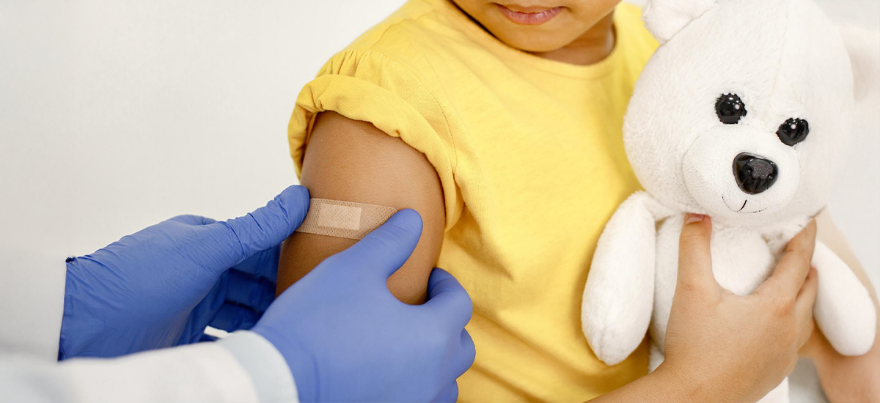Categories
Vaccination Schedule for Children: A Complete Guide for Parents
Jul 18, 2025
As parents, we all want to do everything we can to protect our children from illness. One of the most important ways to keep them safe and healthy is through timely vaccinations. Vaccines help build immunity and protect children from severe infections that were once widespread and often fatal.
At Rainbow Children’s Hospital, we bring our extensive expertise to make this journey simple and stress-free for families. This guide offers a clear, comprehensive look at the vaccination schedule for children, helping you stay informed and on track as your child grows.
Staying on schedule with childhood vaccinations ensures your child is protected at the right time, especially when they are most vulnerable. Not vaccinating your child can leave them susceptible to serious diseases and their potential complications, which can be life-threatening.
The Recommended Vaccination Schedule for Children (as per IAP Guidelines) is given below
It is natural to feel overwhelmed by the list, but you don’t have to manage it alone. At Rainbow Children’s Hospital, our pediatric team works closely with each family, ensuring every child receives timely and safe vaccinations. We maintain clear records, offer reminders, and provide gentle guidance at every step, so you can feel supported and less overwhelmed.
Rainbow Children’s Hospital is among the most trusted names in pediatric care. With our unwavering commitment to children's health, expert pediatricians, advanced immunization support, and a child-friendly environment, we are here to safeguard your child’s health, one vaccine at a time.
Still have questions? Our pediatric team is here to help you navigate every milestone with confidence and care. Book an appointment today at Rainbow Children’s Hospital to ensure your child stays protected and on schedule.
Disclaimer:
The information provided in this blog is for general informational purposes only and should not be considered a substitute for professional medical advice, diagnosis, or treatment. Always seek the guidance of a qualified healthcare provider with any questions you may have regarding a medical condition, symptoms, or treatment options. Never disregard professional medical advice or delay seeking it because of something you have read here.
At Rainbow Children’s Hospital, we bring our extensive expertise to make this journey simple and stress-free for families. This guide offers a clear, comprehensive look at the vaccination schedule for children, helping you stay informed and on track as your child grows.
Why Vaccinations Matter?
Vaccines are not just about preventing common infections. They are powerful tools that save lives. Diseases like polio, measles, and hepatitis can cause lifelong complications, but with routine immunization, they are now rare or well under control. Vaccines prepare the body’s immune system to fight off these infections before they can cause harm.Staying on schedule with childhood vaccinations ensures your child is protected at the right time, especially when they are most vulnerable. Not vaccinating your child can leave them susceptible to serious diseases and their potential complications, which can be life-threatening.
The Recommended Vaccination Schedule for Children (as per IAP Guidelines) is given below
Month-wise vaccination chart for children
At Birth- BCG – Protection against tuberculosis
- Hepatitis B – 1st dose
- Oral Polio Vaccine (OPV) – 0 dose
- DTaP (Diphtheria, Tetanus, and Pertussis) – 1st dose
- IPV (Inactivated Polio Vaccine) – 1st dose
- Hib (Haemophilus influenzae type b) – 1st dose
- Hepatitis B – 2nd dose
- Rotavirus – 1st dose
- Pneumococcal Conjugate Vaccine (PCV) – 1st dose
- DTaP, IPV, Hib – 2nd doses
- Rotavirus – 2nd dose
- PCV – 2nd dose
- DTaP, IPV, Hib – 3rd doses
- Rotavirus – 3rd dose (if applicable)
- PCV – 3rd dose
- Hepatitis B – 3rd dose
- Influenza Vaccine – 1st dose
- Influenza Vaccine – 2nd dose
- MMR (Measles, Mumps, Rubella) – 1st dose
- Typhoid Conjugate Vaccine
- Hepatitis A – 1st dose
- MMR – 2nd dose
- Varicella (Chickenpox) – 1st dose
- PCV Booster
- DTaP, IPV, Hib – Booster
- Hepatitis A – 2nd dose
- Typhoid Booster
- DTaP, IPV – 2nd Booster
- MMR – 3rd dose
- Varicella – 2nd dose (if not given earlier)
- Tdap (Tetanus, Diphtheria, Pertussis booster)
- HPV (Human Papillomavirus) – Recommended for girls and boys
Recommended Vaccines
Some vaccines are not part of the national immunization schedule but are widely recommended for added protection. These include:- Meningococcal vaccine
- Japanese Encephalitis vaccine (for high-risk areas)
- COVID-19 vaccine (as per the latest guidelines)
It is natural to feel overwhelmed by the list, but you don’t have to manage it alone. At Rainbow Children’s Hospital, our pediatric team works closely with each family, ensuring every child receives timely and safe vaccinations. We maintain clear records, offer reminders, and provide gentle guidance at every step, so you can feel supported and less overwhelmed.
What to Expect During a Vaccine Visit?
Most vaccines are given through an injection, and while some children may experience mild side effects like fever or swelling at the injection site, these are usually short-lived. Our doctors will monitor your child closely, answer any questions, and help you feel confident about each dose given.Rainbow Children’s Hospital is among the most trusted names in pediatric care. With our unwavering commitment to children's health, expert pediatricians, advanced immunization support, and a child-friendly environment, we are here to safeguard your child’s health, one vaccine at a time.
Still have questions? Our pediatric team is here to help you navigate every milestone with confidence and care. Book an appointment today at Rainbow Children’s Hospital to ensure your child stays protected and on schedule.
FAQs
1. What happens if I miss a scheduled vaccine for my child?
Missing a vaccine dose is common and usually manageable. Your pediatrician will help catch up using a revised immunization schedule. It’s important not to restart the entire series, just pick up where you left off with proper medical guidance.2. Is the HPV vaccine safe and necessary for children?
Yes. The HPV vaccine is recommended for boys and girls aged 9–14 to protect against cervical cancer and other HPV-related diseases later in life. It is safe and effective, with minimal side effects like soreness at the injection site.3. Are there any side effects of childhood vaccines I should be aware of?
Most vaccine side effects are mild, such as fever, pain, or swelling at the injection site. Serious reactions are extremely rare. Your doctor at Rainbow Children’s Hospital will monitor your child and provide clear after-care instructions.Disclaimer:
The information provided in this blog is for general informational purposes only and should not be considered a substitute for professional medical advice, diagnosis, or treatment. Always seek the guidance of a qualified healthcare provider with any questions you may have regarding a medical condition, symptoms, or treatment options. Never disregard professional medical advice or delay seeking it because of something you have read here.











